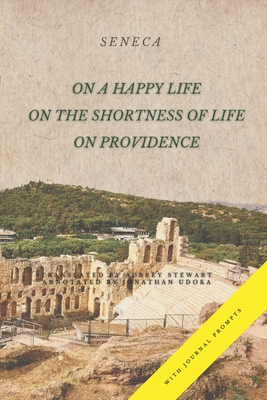On a Happy Life, On the Shortness of Life, and On Providence: (Annotated)

On a Happy Life, On the Shortness of Life, and On Providence: (Annotated)
De Vita Beata ("On the Happy Life") is a dialogue written by Seneca the Younger around the year 58 AD. It was intended for his older brother Gallio, to whom Seneca also dedicated his dialogue entitled De Ira ("On Anger"). It is divided into 28 chapters that present the moral thoughts of Seneca at their most mature. Seneca explains that the pursuit of happiness is the pursuit of reason - reason meant not only using logic, but also understanding the processes of nature.The dialogue has the full title ad Gallionem de Vita Beata ("To Gallio on the happy life"). It was probably written in early 58 or a little earlier. From incidental remarks made in the work, it is thought Seneca wrote it when he was in a position of power near the beginning of Nero's reign between 54 and 59. Furthermore, Tacitus tells us that Publius Suillius Rufus had made a series of public attacks concerning Seneca's wealth in 58, and De Vita Beata contains a defense of wealth which may be a response to this or similar criticisms made around this time.The work ends rather abruptly and is followed in the manuscripts by Seneca's De Otio which is missing its beginning. The earliest surviving manuscript is from the Codex Ambrosianus, a Milan Codex, from the 11th century and other copies are derived from this archetype.De Brevitate Vitae (English: On the Shortness of Life) is a moral essay written by Seneca the Younger, a Roman Stoic philosopher, sometime around the year 49 AD, to his father-in-law Paulinus. The philosopher brings up many Stoic principles on the nature of time, namely that people waste much of it in meaningless pursuits. According to the essay, nature gives people enough time to do what is really important and the individual must allot it properly. In general, time is best used by living in the present moment in pursuit of the intentional, purposeful life.Similar ideas can be found in Seneca's treatise De Otio (On Leisure) and discussion of these themes can often be found in his Letters to Lucilius (letter 49, 101, etc.). De Providentia (On Providence) is a short essay in the form of a dialogue in six brief sections, written by the Latin philosopher Seneca (died AD 65) in the last years of his life. He chose the dialogue form (as in the well-known Plato's works) to deal with the problem of the co-existence of the Stoic design of providence with the evil in the world-the so-called "problem of evil."The dialogue is opened by Lucilius complaining with his friend Seneca that adv
PRP: 65.80 Lei
Acesta este Prețul Recomandat de Producător. Prețul de vânzare al produsului este afișat mai jos.
59.22Lei
59.22Lei
65.80 LeiLivrare in 2-4 saptamani
Descrierea produsului
De Vita Beata ("On the Happy Life") is a dialogue written by Seneca the Younger around the year 58 AD. It was intended for his older brother Gallio, to whom Seneca also dedicated his dialogue entitled De Ira ("On Anger"). It is divided into 28 chapters that present the moral thoughts of Seneca at their most mature. Seneca explains that the pursuit of happiness is the pursuit of reason - reason meant not only using logic, but also understanding the processes of nature.The dialogue has the full title ad Gallionem de Vita Beata ("To Gallio on the happy life"). It was probably written in early 58 or a little earlier. From incidental remarks made in the work, it is thought Seneca wrote it when he was in a position of power near the beginning of Nero's reign between 54 and 59. Furthermore, Tacitus tells us that Publius Suillius Rufus had made a series of public attacks concerning Seneca's wealth in 58, and De Vita Beata contains a defense of wealth which may be a response to this or similar criticisms made around this time.The work ends rather abruptly and is followed in the manuscripts by Seneca's De Otio which is missing its beginning. The earliest surviving manuscript is from the Codex Ambrosianus, a Milan Codex, from the 11th century and other copies are derived from this archetype.De Brevitate Vitae (English: On the Shortness of Life) is a moral essay written by Seneca the Younger, a Roman Stoic philosopher, sometime around the year 49 AD, to his father-in-law Paulinus. The philosopher brings up many Stoic principles on the nature of time, namely that people waste much of it in meaningless pursuits. According to the essay, nature gives people enough time to do what is really important and the individual must allot it properly. In general, time is best used by living in the present moment in pursuit of the intentional, purposeful life.Similar ideas can be found in Seneca's treatise De Otio (On Leisure) and discussion of these themes can often be found in his Letters to Lucilius (letter 49, 101, etc.). De Providentia (On Providence) is a short essay in the form of a dialogue in six brief sections, written by the Latin philosopher Seneca (died AD 65) in the last years of his life. He chose the dialogue form (as in the well-known Plato's works) to deal with the problem of the co-existence of the Stoic design of providence with the evil in the world-the so-called "problem of evil."The dialogue is opened by Lucilius complaining with his friend Seneca that adv
Detaliile produsului










